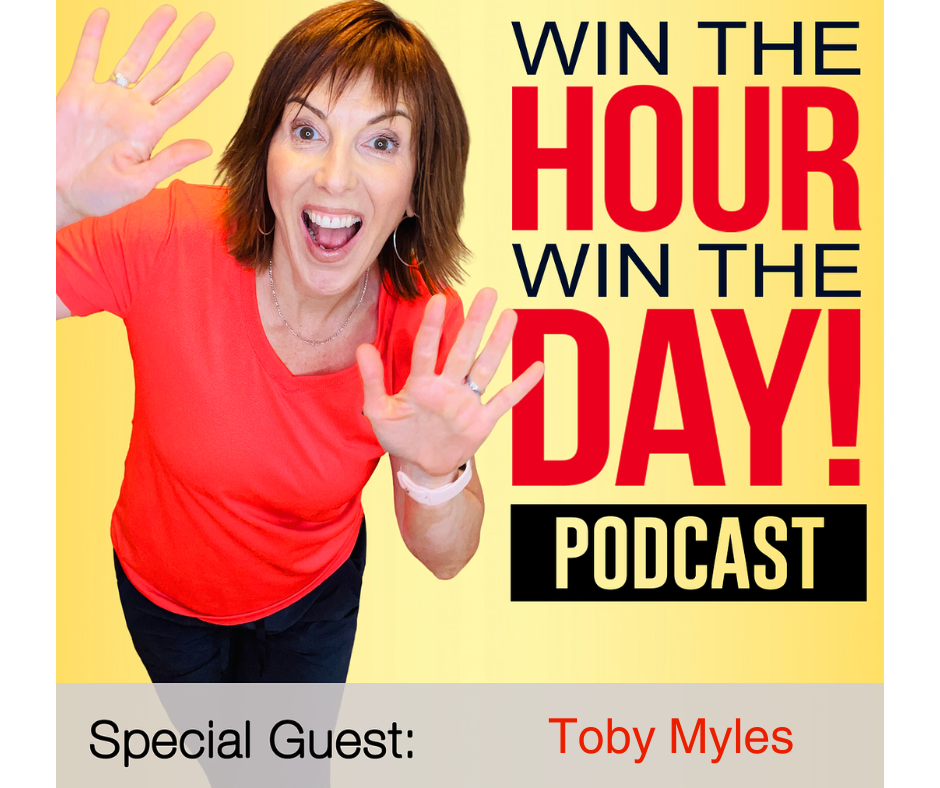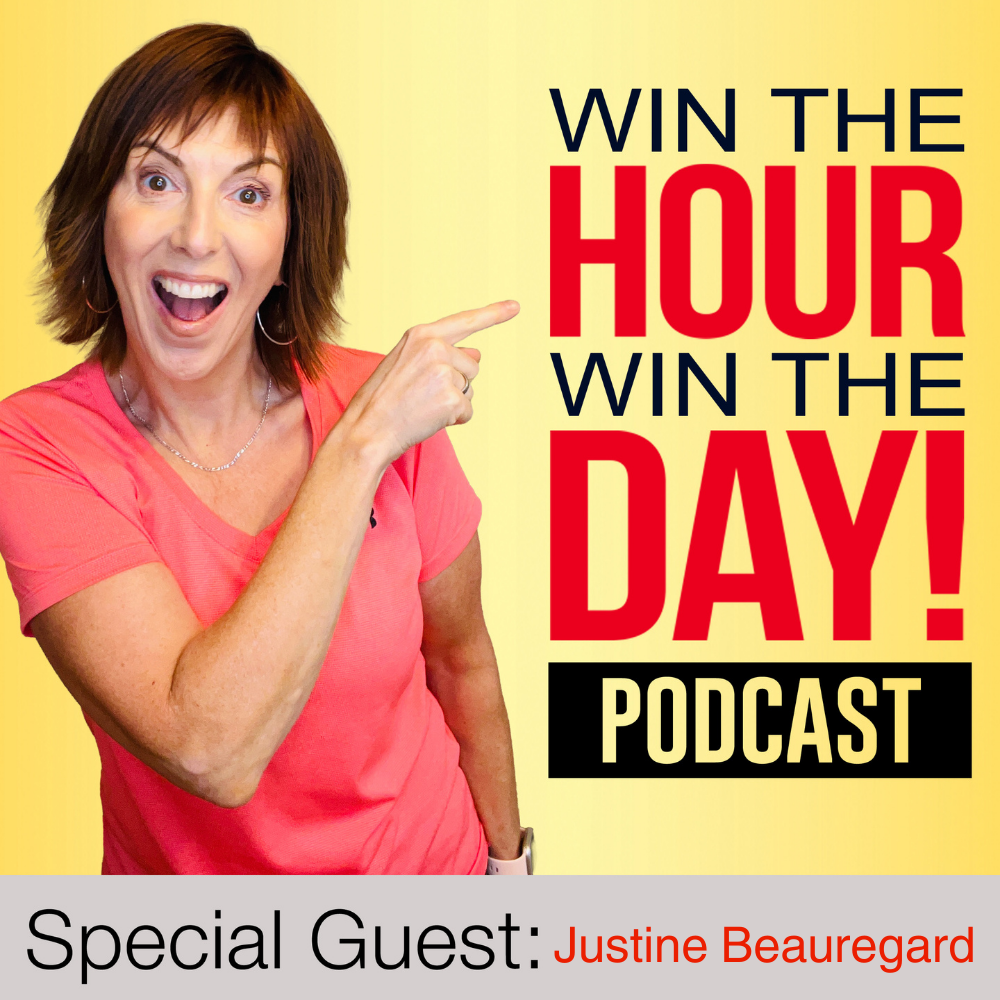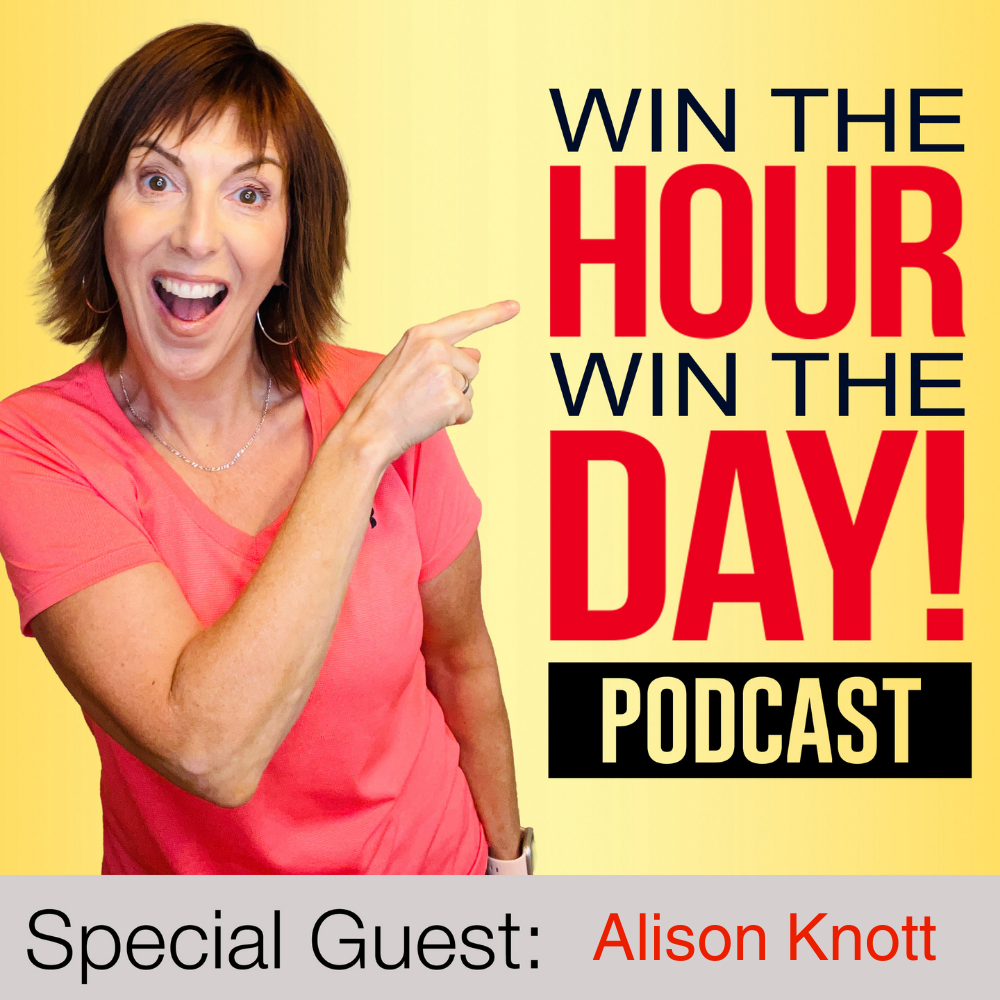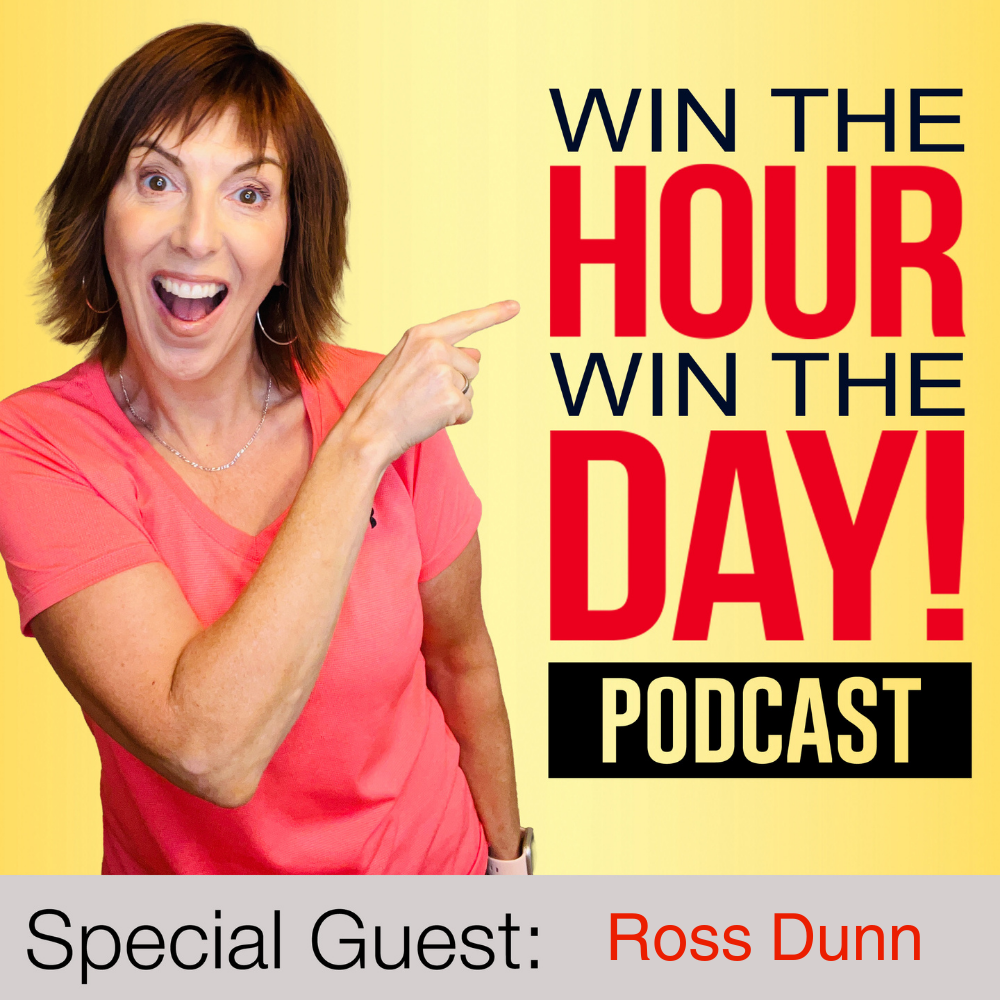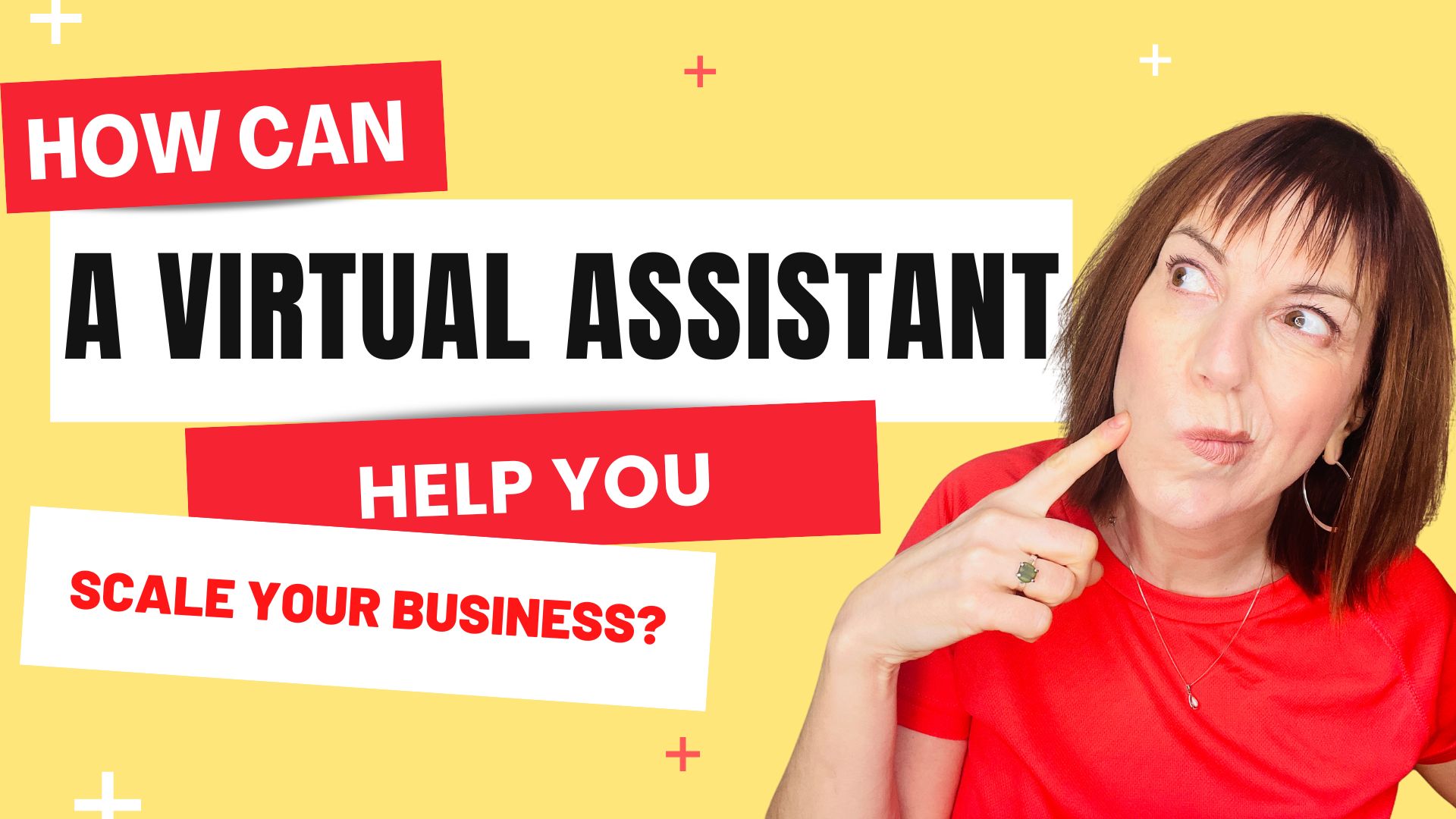Episode Summary
This week’s episode of Win The Hour, Win The Day Podcast interviews, Toby Myles.
Never hunt for story ideas again—Toby Myles shows how simple moments turn into powerful business stories.
In this talk, you’ll learn:
-How small stories can beat big, dramatic tales.
-Eight story types you can use right now.
-A “story hub” trick to save ideas fast.
-Why using client words sells better than fancy copy.
-A quick chart that flips worries into wins.
-Easy ways to show your work, even if it feels boring.
Win The Hour, Win The Day! www.winthehourwintheday.com
Podcast: Win The Hour, Win The Day Podcast https://podcasts.apple.com/ca/podcast/win-the-hour-win-the-day/id1484859150
Facebook: https://www.facebook.com/winthehourwintheday/
LinkedIn: https://www.linkedin.com/company/win-the-hour-win-the-day-podcast
#KrisWard
#SimpleStorytelling
#StoryHubSecrets
Win The Hour Win The Day
https://winthehourwintheday.com
Toby Myles Podcast Interview
[00:00:00] Kris Ward: Hey everyone. Welcome to another episode of Win the Hour Win the Day. And I am your host, Kris Ward. And today in the house we have Toby Myles and she is a Storytelling Coach. Now listen, I know we hear about storytelling and ah, it’s important and it’s a foundation of everything we do, blah, blah, blah, blah.
[00:00:18] Kris Ward: And sometimes, you know what? I’m tired of hearing that story about storytelling, but if you’ve ever had a little bit of storytelling fatigue, oh my gosh. Toby is gonna she’s just gonna wash that right off you. You’re gonna be fine. I have learned so much in just this short time that we’ve been talking about this. So first of all, welcome to the show, Toby.
[00:00:37] Toby Myles: Thank you for having me. I’m excited to talk about my favorite, one of my favorite topics.
[00:00:42] Kris Ward: Okay you do breathe fresh life into storytelling, so I wanna get right at it because there’s all the regular stuff that we know. But let’s just start off with some of the basics, okay. So we tend to, I think, over comp overcomplicate stories or think we have to [00:01:00] have these big arcs, or it has to be I don’t know, crafted. And you really have a much simpler approach to that. And I, so let’s start there. Where do we start?
[00:01:08] Toby Myles: Yeah. First of all, stories are everywhere. And I am a firm believer in, once you start to think about a simple story framework, okay.
[00:01:17] Toby Myles: And just like. Open your eyes to everything around you. You will start to see how every day you’re gonna stumble across stories that you can apply to almost any situation. So it’s context. Know your audience, know who you’re speaking to, know what your goal is, share a challenge, how you overcame that challenge, or how you, a client, you helped, overcame that challenge and what was the lesson learned?
[00:01:45] Toby Myles: And it really can be that simple.
[00:01:48] Kris Ward: So when I hear that, my first pushback a little bit is when I see people write a story and I don’t know let’s say, I don’t know, let’s say they’re going on vacation and they run into some issues with their ticket [00:02:00] and they’re having a hard time on the airlines and they drag this big long story out, right?
[00:02:03] Kris Ward: And then you get to the end and then they say, and this reminds me of my business where I had hip, hills and valleys and all. So they’re tying it down, but the stretch. It reminds me of those commercials when you get some sort of former athlete going. When I miss the net as a basketball player, it reminds me of when my dentist missed the mark, and that’s why you need this kind of insurance.
[00:02:24] Kris Ward: So I thi I see a lot of people doing this poorly. And I think with your approach, I know one of the things you said to me, and it seems so basically simple, I was annoyed at myself. You’re like, write down three reasons why you started your business. And I’m like, oh, because I think we all go so complicated.
[00:02:40] Kris Ward: Okay, I have to write, this story has to be craft, it has to be all these things. You have to have, it doesn’t the arc. And then when I think, oh yeah, here’s three reasons why I start my this business, right? That’s simple. And from that can expand from there. So I think that’s the beauty of what you do is the simplicity of it.
[00:02:55] Toby Myles: For sure. And so that piece of it, that kind of what I would call your [00:03:00] origin story, what was the thing, what was that moment? And a lot of us can think of that moment where these things collided, where we realized we’re really good at something and this could be a business. This is the basis for my business and how I’m gonna help people.
[00:03:18] Toby Myles: And it doesn’t have to be some deep, horrific thing that happened, or tragic thing that happened. It could be something really very simple. And that can be a story. There are other things like client success stories, your visions, vision and mission story. Showing something behind the scenes of how you do your job and how you help people.
[00:03:38] Toby Myles: Personal growth stories. You can take objections that people show up with when they say I don’t know if I can work with you because X, Y, and Z. Use those objections to craft a story.
[00:03:51] Kris Ward: Right now when you said that every example you gave, I had a clear idea of oh, I should write this story. I should write that story.
[00:03:57] Kris Ward: But. I think [00:04:00] we all go, I have to write a story. And then you look at the ceiling and go, okay, I got what happened. Or we think it needs to be larger and more dynamic than it is. And I also think that when we move away from stuff, like when you said, why did you start your business, right? And I know for me where my business pivoted a quick example, I call myself a recovering rusha holic.
[00:04:18] Kris Ward: So if you’re listening, we’ve got visit, free gift from Kris KRI s.com and in there is a quiz to tell you which person, a business personality you have. So I’m a recovering rusha holic, a turning point, which I used to talk about all the time, and I don’t anymore. ’cause time has passed, right?
[00:04:35] Kris Ward: There’s a gap between when this happened was I always thought speed was my superpower. I could go quickly, move fast. And frankly, the rest of the world annoyed me ’cause they just could not keep up. So I thought, that’s on them, not me. Yeah. And I didn’t realize how I wasn’t getting traction.
[00:04:48] Kris Ward: There was no depth to anything I did. I was just in a constant, my husband used to say I was rushing to my death, like, where are we going? And but I remember one time I was blow drying my hair and brushing my teeth because [00:05:00] my God. Why would you do one thing at a time when you might waste, I don’t know, two, three minutes, right?
[00:05:05] Kris Ward: So here I am of, and then at the same time, all these file drawers open in my head thinking of all the things I have to do and the tap is running. And I caught at the last minute that I went to put the blow dryer underneath this sink instead of my brush. I know. And then I stepped away and I was like, oh, you’re not.
[00:05:22] Kris Ward: Kris, like every lecture I’d heard from people telling me to slow down after, I thought they were all isolated incidences, even though there was hundreds of them. And then I was like, oh, maybe these people are right. And I never even told my husband this story ’cause I was like, he does not need to know how unsafe we were.
[00:05:36] Kris Ward: But I used to tell that story in the beginning and now I, when you asked me my origin story, I was, there’s one of many, but I haven’t thought about that in years. And just the way you laid that out, you gave me about 10 different ideas and I think we all struggle with. I need to write a story, and I think first of all, the show notes will be here, but write, we’re like minutes in and I would say, write down, [00:06:00] replay this, write down, we’ll put it in the show notes.
[00:06:01] Kris Ward: Write down the 10 ideas that Toby just gave you. And I think you get five and 10 ideas just from those. And it’s so simple, but so profound.
[00:06:10] Toby Myles: Yes, for sure. And I would also say start what I call a story hub. Yeah. That’s what I call it. It could be anything and you can put it wherever you want to. Google Drive is probably the easiest place because you can easily write in there and make it searchable and tagable so that you can find these.
[00:06:26] Toby Myles: Things like overcoming fear a time that you struggle, things like that. But set up the framework for yourself of all these different types of stories so that you can just start recording them. Don’t think, oh, that’s a great idea for a story. And then not write it down because you’re not gonna remember, you’re not gonna remember it.
[00:06:42] Toby Myles: Like we, we kid ourselves like, oh, I remember that. No, you won’t create your system again. Could be Google, could be done in Notion. I use Google and Asana. Wherever is your preferred place. Yeah. That you know you’re gonna go to. Don’t over complicate it and just start building that story [00:07:00] hub.
[00:07:01] Kris Ward: Yeah, I have what I call an idea bank, and I put it in notion. I have different categories, but I think even then I’m still looking for bigger stories. Whereas examples you gave are so simple that I think in that idea Bank, you’re right. I think we need to have the framework of what’s your origin story or what’s because I’m looking for something large and profound, or I’m standing in the week looking ahead when we already have some, we have experience, we have stories we have things happening.
[00:07:26] Kris Ward: Yes. Okay so I think we, or at least I should speak for myself over complicate stuff. So you’re always talking about how there’s golden nuggets in different stories, and you also talk about the eight core essentials in stories. So let’s dive into that.
[00:07:39] Toby Myles: Yeah. So well, so the eight core stories are the origin story.
[00:07:44] Toby Myles: Okay. Okay. Your vision story, your client success stories, your failure and lesson stories behind the scenes stories, personal growth stories and objection handling stories. I think that was me. Okay.
[00:07:57] Kris Ward: Okay. So we’re revisiting them, which is good ’cause I didn’t even know [00:08:00] what they’re called now. I know what they’re calling.
[00:08:01] Kris Ward: Yes. Just thought they were great ideas. Okay.
[00:08:03] Kris Ward: Alright. Excellent. Personal growth. And what was the last one?
[00:08:06] Toby Myles: Handling objections.
[00:08:08] Kris Ward: Handling objections. Oh my gosh, yes. Okay. Alright. Let’s tap into each one of these ’cause I think they’re really important. So we talked a little bit about the origin story.
[00:08:18] Kris Ward: I gave that an example, so that’s fine. So vision story, that sounds broad to me. Oh, like where do we go with that?
[00:08:24] Toby Myles: Yeah. Your vision story. It is broad and it’s a little bit different than your origin story, which is your origin story is. You’re looking back.
[00:08:33] Kris Ward: Okay.
[00:08:34] Toby Myles: At that point, that moment in time where you’re like, this is the thing I’m meant to do and this is how I’m gonna help people.
[00:08:39] Toby Myles: But your vision and mission story is really you clarifying how you’re gonna help people. Okay. People struggling with telling stories, for example. Okay. Yeah. And so my vision story is to help more people find those genuine stories. So that they’re never floundering around [00:09:00] trying to figure out what to talk about and how they help people.
[00:09:02] Toby Myles: And it’s not enough to use a template or borrow somebody else’s words because those aren’t your stories. Those are somebody else’s stories. You need your own stories. I.
[00:09:12] Kris Ward: Okay, so your vision is could be maybe not interchange with your passion, but I believe your business should support your life, not consume it.
[00:09:19] Kris Ward: And so it’s ’cause vision. I think we get, it always reminds me of your mission statement or your vision is, seems it gets like glossy and broad, but you’re just saying no, here’s where I’m moving towards. ’cause it’s so important. My vision is that everybody shouldn’t have, you should never have to suffer with your stories.
[00:09:38] Kris Ward: You should just come to, ’cause you’ve living a life, you’ve got stories.
[00:09:41] Toby Myles: Exactly. And you shouldn’t have to suffer and you shouldn’t have to feel icky. When you’re trying to tell a story that doesn’t belong to you, it doesn’t, it you don’t fit. It’s like a Yeah. It’s like a pair of jeans that are too tight, like they’re not yours.
[00:09:52] Kris Ward: Yeah. Or like that story I gave the example of the bad insurance commercials where they try to make it a link and there’s no link there. Yeah. [00:10:00] Okay. So we got your origin story, your vision story. My, my notes I wrote really quickly. What was the third one?
[00:10:05] Toby Myles: Client success stories. That’s
[00:10:06] Kris Ward: oh yes, that’s yeah. There we go.
[00:10:08] Toby Myles: That’s pretty straightforward, right? Yeah. This client came to me, they were struggling with this. We did this and…
[00:10:14] Kris Ward: okay, so now you say it straightforward, but I think we forget it all the time. Every time I’m sure I am. I’ve had other people, different degrees of storytelling, talk about this, and I swear every time I get off I’m like, I gotta do more of these I have, the nature of what I do, people truly get their lives back. They fall back in love with their business. They start spending time with their family. They get some peace of mind. And yet I’m telling you, I’ll hop, if I’m lucky, I’ll hop off this call.
[00:10:45] Kris Ward: I’ll write one and then I think I have one per hundred possible stories that I write if I’m lucky. I don’t know why we forget those all the time, so you may seem obvious to you, but it, I feel maybe we pull away from that because we think it’s [00:11:00] selling or I think for me in the past, I got stuck on, I felt like I had to tell the story behind the story.
[00:11:07] Kris Ward: That’s always been my problem. It’s oh, let me tell you about this client and why it was such a craziness in her life. And then so let me tell you her backstory so I can tell you what we did. And I just, I think I got lost in it that it was too big of like too complicated of a story, right? Yeah.
[00:11:21] Kris Ward: Like we’re not, my not sitting around at my dinner table and I’ve got all night, so I don’t know why, but and you, I see this on LinkedIn. I’m pretty active on LinkedIn, and yet I still think I’m not the only one that misses this. I think we miss this a lot.
[00:11:34] Toby Myles: I think we do too. And I think that think about your own behavior where you’re about to buy something or make a decision about something.
[00:11:42] Toby Myles: I know, right? What you wanna know is you wanna see how did this person help other people? How do I see myself? The stories of the people that this person has already helped. And that is, it can be so simple. It can be, I think about this all the time too, just in my neighborhood, [00:12:00] if I need something done, what do I do?
[00:12:02] Toby Myles: I go to my neighbors, tell me
[00:12:03] Kris Ward: yeah,
[00:12:04] Toby Myles: who did you get to do your roof? Who did you get to unclog your gutters? Like those things.
[00:12:09] Kris Ward: Yeah. Yeah, you’re so right. And I don’t even have words for it. ’cause I don’t know, I don’t have an excuse of why we’re not doing that. And I do, you’re right, when I look at stuff online, you wanna hear somebody using your words, right?
[00:12:24] Kris Ward: It’s or coming from your perspective okay, i, listen, I’ve tried numerous things and I didn’t think it would work. And then what I loved about Kris was she was no nonsense. She got right to it. It’s oh, great. A lot of my clients say that about me.
[00:12:35] Kris Ward: I’m very, no, no fluff big results. Let’s just get to it, right? And I had a client leave me a message on Voxer and he was like oh my gosh, Kris, everybody else promises the world and they just try to hold you accountable. And this, it’s all bs, but you just get in there and get stuff done. And I’m thinking that language he’s using that would resonate with my other clients.
[00:12:53] Kris Ward: ’cause they’re all like that. They don’t want the fluff, they don’t want big, long conversations. They just wanna get to it. If I’m purchasing something and I hear people [00:13:00] that sound like me, it’s oh, they. I’m impatient. I want results fast. And they sound like they’re like that too. Yes.
[00:13:06] Kris Ward: It’s okay, great. That validates what I saw in the marketing. ’cause now I realize, oh, this substance here. So I think you’re right. But we missed that over and over again. I, this is gonna be my new, I’m gonna have this. We are, this is going to be serious stuff. I’m following this formula.
[00:13:20] Kris Ward: I’m not kidding you. Okay. Because I think the next one is just as bad, the behind the scenes. I think for me, like I’ve got clients where, I’ve got an international dog trainer, I’ve got a designer when they’re doing things that are visually more stimulating. Or interesting, although in fairness, even to my client, I
[00:13:43] Kris Ward: with the designer and she’s working on these crazy hours and now she works like part-time and she travels the world. It’s all great. So I’ve done my work with her and even her, I’d say, look, it’s not my job to tell you this, but you should be doing a lot of behind the scenes stuff because you have so many stories.
[00:13:56] Kris Ward: Like it’s so visually pleasing, it’s before, it’s after why are you not doing this [00:14:00] right? And that’s not even my job. And I’m telling her even I can see there’s missing, but in my job, I think, oh, I’m at the computer a lot, or I’m talking to my clients. There’s nothing ex, I don’t know, exciting or ex, there’s no sausage to show how it’s made.
[00:14:17] Kris Ward: There’s nothing sexy about it, right? It’s a lot of admin work and moving things around. So then I think I skip over that too, but. But then I see other people that do more boring work than I do, and somehow they’re showing behind the scenes, even if they do a B roll of them talking to their clients all day.
[00:14:33] Kris Ward: I’m like, damn, I do that. I could do that. Yeah. Yeah. So I think we missed that one too.
[00:14:38] Toby Myles: Yeah, I think we do. I’m in a similar situation, I sit at my computer, there’s nothing that much, visually to show. But yeah, I think that the trap that we fall into is that we do this day in and day out.
[00:14:51] Toby Myles: So to us it doesn’t seem that interesting, and we forget that to other people who may be thinking about hiring us. It is interesting. How are you going [00:15:00] to get me? You’re telling me you can help me. How are you going to get me there without selling your secrets, obviously, but you give a little glimpse into the process.
[00:15:09] Kris Ward: But I think when you say that, what’s really interesting, one of the questions I get all the time, ’cause people come to me and they’re strapped and they’re stressed out on time. And they wanna, okay, like any other program, how much time is this gonna take? And I’m like could take you 10 minutes a day, but you’re gonna be constantly getting time back.
[00:15:24] Kris Ward: But there, you’re literally looking at 10, 12 minutes a day if you want. It could be a little bit more, a little bit less, whatever. And the simplicity of my program and how interactive it is, how customized it is, I do know that’s different that’s out there than what’s out there, and yet I’m not talking about that.
[00:15:40] Kris Ward: The ease of use, the access to me, the fact that it really does take minutes a day and you do get time back and it’s not okay. I don’t even have time to make, to find time to do this thing. I should be selling the simplicity of it and how easily integrated it is. I don’t talk about that either.
[00:15:57] Toby Myles: And also because I know about your process it’s [00:16:00] simple, but it’s also very customized, right? Yeah. It’s not a one size fit, all fits all. You have your framework for how you get your clients to have these transformations and get their time back, but you also are very tapped into that person and how they work.
[00:16:15] Toby Myles: Where are they starting from when they come to you. And so I think that is also a unique identifier for you. And as it would be for a lot of people. There is some secret sauce, and maybe you have to separate yourself a little bit to really find that and to be objective, right?
[00:16:30] Toby Myles: Because again, you do what you do day in and day out.
[00:16:34] Kris Ward: I think we always look for the big stuff. Like we’re always, I think stepping what I’ve had to learn over the years is sometimes I feel like we step over questions and I have started to do this where I have a question bank. So if I get off a sales call in the transcript, we take the questions out, we put them in the question bank because that’s content too, right?
[00:16:53] Kris Ward: And I think we have like throwaway questions. So when somebody will say to me. Something like, oh, I wanna hire a va, but my [00:17:00] client’s really high end and I can’t have people that don’t speak English. To me, that’s like the silliest thing I ever heard in my life. First of all, if you live in North America, I’m in Canada.
[00:17:08] Kris Ward: Literally, I was talking to somebody at can Canada Revenue Service, which is like the RI, what A IR RSS kind of deal? The woman did not speak very good English at all. Like we’re a melting pot. And I felt like saying, ladies, yes, we gotta freaking get this right because this is my business taxes and I have to understand what you’re saying ’cause this is important.
[00:17:25] Kris Ward: So first of all, we deal with people all day long who don’t speak great English. Secondly. Then don’t hire somebody. All the VAs I find for my clients, frankly, speak better English than I do. So to me it’s oh, that question again? So I step over it and I say, that’s silly. Why would we hire someone that didn’t speak good English?
[00:17:44] Kris Ward: That doesn’t, I don’t even know if that’s not good English. Why do we hire somebody that doesn’t speak good English? Why don’t we hire somebody that’s doesn’t speak English well, thank you. So I’m throwing away that question, trying to get to what I think is more high level stuff, but if that’s what they’re [00:18:00] asking write a damn post about it, right? Yes. That’s your content. Yeah. And I think we step over those things.
[00:18:05] Toby Myles: Yep. Yeah. So that also ties in with objection handling. Yes. If that’s something that comes up over and over again, that’s part of knowing your audience. Who is your audience and what do they need to hear?
[00:18:14] Toby Myles: And if that is a question that comes up over and over again. One thing you can do too, and this goes back to my early days of copywriting, when I would dig into a voice of customer research where you actually start a chart and you make a listing of all these objections or all these things that people say and you rate them, oh, there’s that again, and again.
[00:18:35] Toby Myles: And when you look at, you’ve got 10 people basically saying a variation of the same thing. That’s something that you need to use in your copy, in, handling objections. For sure.
[00:18:46] Kris Ward: That is so good. Oh my gosh. Write that down. Objection chart. All my heavens, because I do, I I get a lot of people that either think they have ADHD or they’ve developed ADHD by having their own business, right?
[00:18:59] Kris Ward: So that’s another [00:19:00] you don’t understand, Kris. I’ve got ADHD and then sometimes they don’t even have ADHD, they’re just a hot bloody mess all over the place. So then they look at the symptoms and think, oh, I guess I’ve now grown into ADHD, right? But you’re right, or so I’ve got I have those questions or characteristics and I just again half roll my eyes.
[00:19:17] Kris Ward: No, you’re just running around in different directions like know, chasing marbles, it’s because you have no setup. We’re gonna fix that. And then suddenly your ADHD is just gonna melt away and, okay, please. I was gonna say, don’t write me, nobody knows where I am. I’m not like a big news reporter here or something.
[00:19:33] Kris Ward: But what I’m saying is I’m not minimizing the ADHD. What I would say is, if you do have ADHD and I do have lots of clients that do, then you need this even more. So I should be writing about that even more, right? You either don’t have it. Yeah. You’ve been so stressed out. You think you have it or you do have it, and this is why you need this more.
[00:19:51] Kris Ward: But again, I just step over that question going, that’s okay. A lot of my clients have A-D-H-D-I can help you, blah, blah, blah. But I get, I’m stepping over [00:20:00] that to get to what I think is, oh, here’s the, almost like the entree. Yeah. Yeah. I eat your salad so we can get to the main meal. Yeah. Yeah. And that’s not the way to go. Okay. Oh my gosh. Lots of aha moments here. Okay. Personal growth. Here’s where I think we get stuck, because then it’s all this, to me, this always comes out as, all right, I was, my village burnt down. I was beaten by my alcoholic father. I’m still with PTSD, and let me tell you how this relates to my business.
[00:20:29] Kris Ward: And I’m not minimizing of all these things happen to you, but I, for me, it’s not going. Whether I had trauma or didn’t, I don’t like to revisit it since I didn’t enjoy it the first time. So it’s not gonna be where my posts are at, and I find that’s where we all go. I don’t wanna be talking about personal growth.
[00:20:49] Toby Myles: Yeah, I, to me and that’s a touchy one. I know a lot of people like to talk about that, and I personally tend to avoid it myself as well. Unless it’s relevant [00:21:00] and yeah, oftentimes it becomes relevant in a private conversation, not for an email I’m sending or on social media. And it is relevant if you’re a social worker or you are a recovery coach, right?
[00:21:14] Toby Myles: Yeah. In those situations, yeah, it’s relevant. And so the thing about what we choose to put in our stories is. It’s important to decide what we put in, but it’s also just as important to decide what we leave out. Like not everything belongs in your story. It just doesn’t.
[00:21:28] Kris Ward: And I think to your point now I’m reframing this in my mind is.
[00:21:33] Kris Ward: It’s my personal growth and what I’m learning from you is these are very broad but helpful really encouraging opportunities to tell stories. And so if my personal growth comes from this level of intimacy, then stay there. ’cause that’s who I am and that’s how I operate. And then I don’t have to. I think the beauty of what you do is it allows so much room for your personality or broadness of character, gives you [00:22:00] so much more to choose from.
[00:22:01] Kris Ward: So I’m not pinned down to, I have to tell a trauma and do this and do that. I’m like, okay, where’s my personal growth? My personal growth could just be, it could be. It could be really something minor, but significant and relevant and just whatever it is it, I, it will be in the comfort zone that I have.
[00:22:19] Toby Myles: Yes, absolutely. It has to be in your com and it has to be relatable to your audience. Like again, it goes back to knowing your audience. Where are they and what is your goal for them as you bring them through these stories? So even personal growth, like I think of personal growth can also be things like where was I when I started my business journey?
[00:22:38] Toby Myles: I was somebody that just thought, I will write every single piece of copy. I’m barely gonna charge anything for it because this is how you start a business. Now, six years later I realize that is not respecting. My what? My skillset is how I can really help people.
[00:22:56] Toby Myles: And so there was personal growth in that too, realizing no, I have so much [00:23:00] more to offer people. Why am I, disrespecting myself, so to speak.
[00:23:05] Kris Ward: Yeah, and I think you just gave a really good example. We tend to now, or I’m at least conditioned when I hear personal growth, I have to have, here’s my trauma.
[00:23:12] Kris Ward: But the personal growth can be like the story I told earlier. You know what I thought my superpower when I started my business was my speed. I could get stuff done and I didn’t realize I wasn’t a treat to be around. I was every, listen, I said to somebody on my team once and I’m write this down ’cause they did not appreciate this.
[00:23:27] Kris Ward: He’s been with me for 12 years now. I’m like, Evan, oh my God, can you talk faster? It didn’t go over well. He didn’t like it. So because he talks slow, he knows that. So I’ve had to slow down. He’s had to speed up a little bit. But so personal growth is a, that did not speed up the meeting. I’m here to tell you.
[00:23:45] Kris Ward: Secondly, that was not helpful. Full. The fact that I thought I could just go faster and get more things done. So my personal growth was how much I was missing out on details and the depth of things in enjoying the process and having creativity. ’cause it was just like running [00:24:00] hurdles.
[00:24:00] Kris Ward: I was always, what’s the next thing? Yeah. So that could be a personal growth story where I think so often the way. People roll out storytelling. It always has to be this big emotional hook. And so with your example, it’s okay, I got personal growth in that. That’s good. I’m comfortable sharing that.
[00:24:15] Kris Ward: Yeah, that’s relatable. It doesn’t have to be about the dog dying. I. Exactly. Okay. Okay. My goodness. Okay. Oh, Toby, there’s so much we could have. You could be, have Thursdays with Toby is what we could have. Okay. Alright. Fantastic. Where can people find more of your brilliance?
[00:24:33] Toby Myles: I am primarily on LinkedIn, Toby Miles.
[00:24:36] Toby Myles: Okay. I, you can hop over to my website, tobymyles.com. As I’m starting a podcast very soon. Oh yes. It’s not launched yet, but that will be soon out there in the world. Her origin story. I’m somewhat on Instagram. Toby Myles, copywriting, not as much. More on LinkedIn.
[00:24:56] Kris Ward: Okay. Alright. Toby Myles, M-Y-L-E-S. And we’ll [00:25:00] have it in the show notes. Oh my gosh. Share this episode with a business buddy. Do not have them banging around by themselves. There’s lots of really broad strokes here that we’re incredibly helpful. Be somebody’s hero. Share this with a business buddy.
[00:25:12] Kris Ward: Alright, everyone else, we will see you in the next episode. And again, Toby, thank you so much.
[00:25:17] Toby Myles: Thank you for having me Kris.

